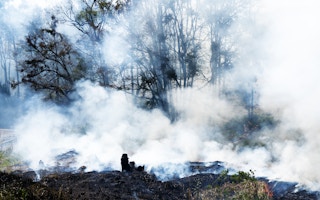Recent laws enacted to tackle the haze pollution plaguing Southeast Asia are a welcome move but will do little to tackle the issue if the root cause is not addressed, said environmental groups on Thursday.
Singapore recently passed a Transboundary Haze Bill which punishes errant companies whose actions result in haze in the city-state, and Indonesia’s Parliament ratified the Asean haze agreement in September.
But clearing the haze “is not simply a matter of enacting strong laws against burning, then prosecuting people who light fires”, said Teguh Surya, political analyst with Greenpeace Southeast Asia’s Indonesia Forests Campaign.
Haze has been blowing into Malaysia and Singapore in recent weeks from forest and plantation fires in the southern part of Sumatra - a recurring problem that has plagued the region for almost two decades.
Teguh noted that many of these fires are occurring in peatland, which have been cleared and drained for oil palm and pulp plantations.
“Once fires start in drained peatlands, they burn and burn, smouldering underground, and no one can effectively deal with them until the monsoon comes,” said Teguh, who was speaking on the sidelines of a roundtable dialogue on haze organised by the Singapore Institute of International Affairs (SIIA), a Singapore think tank.
The question of who was to blame was discussed at the roundtable, to which he commented: “The companies are quick to point the finger at farming families, who they say don’t have the technology to properly manage the land, and so resort to burning before planting crops. But blaming local communities is disingenuous at best.”
The peatland is drained by massive networks of canals dug with excavators - heavy equipment that small-scale farmers do not have, he added.
He noted that four prominent traders in palm oil – Wilmar International, Golden Agri Resources, Cargill and Apical, part of the RGE Group of companies, committed to a no deforestation pledge at the UN climate summit in New York in September.
“Now the question is what proactive steps these traders will take to prevent fires in their supply chains… these companies need to urgently push all their suppliers to immediately stop the clearance and drainage of peat lands,” he said.
Cargill director of corporate affairs, Colin Lee, told Eco-Business that the company is working on implementing this but it would not happen overnight.
“Our no deforestation and no peat development policy is being applied to all our suppliers,” he said. But this process is a “work in progress”, which Cargill is tracking and will be publishing details in a palm oil progress report before the year end.
He also suggested that while private sector companies work to green their supply chains, governments can also play a role in their countries by banning the import and export of palm oil that have not been certified sustainable, or provide incentives for companies which purchase sustainable palm oil.*
Speaking to the media on the sidelines of the roundtable, SIIA chairman Simon Tay said he was optimistic about the efforts to tackle the haze issue, adding that “all the ingredients are there” for real progress to be made.
The mood of countries is “not so much finger pointing… but finding ways to work together to solve this problem”, he said.
“
The companies are quick to point the finger at farming families, who they say don’t have the technology to properly manage the land, and so resort to burning before planting crops. But blaming local communities is disingenuous at best.
Teguh Surya, political analyst, Greenpeace Southeast Asia
SIIA will also be launching a new haze portal by the first quarter of next year, which will combine information about real-time hot spots, wind direction and land-use and concession maps on one platform.
“Until Asean governments can move things forward with the joint haze monitoring system (HMS), there is a need to plug an information gap in collaboration with our NGO and corporate partners,” said Tay.
The maps will not be perfect, but this is why it is important to gather them in one place and, by making it available to the public, improve them, he added.
“We believe reliable and transparent information is crucial if we want to deter slash-and-burn and other unsustainable practices in the resource sector,” he explained.
Asean leaders had adopted a Singapore-developed haze monitoring system last year to aid the identification of fire and haze culprits by overlaying high-resolution satellite images on land use and concession maps. But the launch was stalled as some member countries were reluctant to make public their maps due to legal concerns.
In the development of its portal, the SIIA said it will seek input from its NGO partners with relevant expertise, such as the World Resources Institute (WRI), which is running the Global Forest Watch platform to monitor deforestation rate in Indonesia.
This effort was endorsed by some 40 academics, corporate and NGO representatives attending the haze roundtable held at The Regent hotel.
The institute will also be holding its first public exhibition “Haze: Know it. Stop it” at Singapore mall VivoCity from 7 to 9 November.
“Transboundary haze is more than an environmental hazard. It affects public health. It hurts many businesses. It is also a diplomatic issue. We hope our exhibition can help the public understand the issue more broadly,” said SIIA’s deputy director Chua Chin Wei.
*Editor’s note, 12 Nov 2014: Cargill has clarified that it is not calling for governments to ban the import of uncertified palm oil, as it would mean the loss of many jobs overnight. Instead, governments can consider import incentives such as lower tax for certified sustainable palm oil, which can help discourage unsustainable or irresponsible production practices.

















